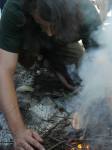
This article is written in honor of my late Aunt Jean. As a former girl scout and camp counselor, Jean Marie Chisholm was an inspiration for my own career running summer camps. Throughout her personal and professional life, Jean knew how to care for people with disabilities, terminal conditions, and other health issues … as well as for lonely nieces and nephews when we were far from home as children and college students.
My first memories of Jean are when she traveled down from Wisconsin to take care of me, just 3 years old in Columbus GA, during a week when my parents and older siblings went on a trip to visit cousins in Nashville. I was beside myself missing my folks, so I remember she asked neighbors to bring their dog over whose “lick was renown for making anyone smile and laugh no matter how sad.” My clear memory was obstinately steeling myself to keep crying forever or until my parents returned, but the miracle occurred and I was laughing with the dog as soon as its tongue licked my cheek.
Jean turned 90 on election day 2016 and but didn’t get her wish to see the first woman president in her lifetime. She was diagnosed with cancer a month later, refused invasive treatments saying she lived a good life and was fine with passing, then died peacefully without pain later in the winter. Memorials in her honor can be made payable to her regional scouts council, the GSNWGL – Girl Scouts of the Northwestern Great Lakes.
The Homesickness Specialist

Wolf Camp and the Conservation College is fortunate to have a homesickness specialist on staff. Lily, our camp dog who, in addition to being a counselor specializing in homesickness prevention, also happens to be our best wildlife tracker as well human tracker in case anyone gets lost. She’s a great risk management resource for that reason, but even more, she’s also our most experienced survivalist on staff, having spent the first 4 years of her life on the streets.
One of the first things we do when campers and apprentices arrive in the summer is to introduce Lily. It’s homesickness prevention 101 and works like a charm because, having survived her first 4 years by playing the “omega” role around other dogs and people, she has the perfect temperament for kids as well as shy or sad people. Still, we continue to serve homesick participants – about 1 per week who are debilitated by feelings of loneliness.
Dealing with Normal Homesickness
Part of our job is to make certain tricks of the trade part of the camp culture which prevent normal feelings of homesickness from getting out of hand. These include:
- Ritual, music, and group activity to create attachment/bonding. We ensure that happens within the first hour at Wolf Camp. If provided healthy structure, people can form new relationships that provide healthy attachments right away.
- Having myriad opportunity for expression – songs, skits, and other rituals – demonstrates to children how appropriate expression is the anecdote for oppression, depression, and other problems caused by withholding thoughts and feelings.
- Putting away the phones and instead, practicing communication. Icebreakers should include at least one exercise that teaches participants how to resolve a small annoyance before it leads to a bigger problem. For instance, teasing someone for being from Canada, eh, is funny the first time, but still at least little annoying to Canadians even the first time an American does it. An exercise to show people how to stop undue teasing, at least by the second time it occurs, before conflict erupts.
- Getting people to sleep before it gets dark. This is critical to prevent homesickness, because darkness is the #1 trigger. Getting to sleep at the right time also serves as a risk management protocol: people get injured and lost when tired and after it gets dark in new environments; not to mention the fact that naughty teens can utilize the cover of darkness to avoid sleep and rules, causing problems the next day.

We also screen for severe homesickness when campers register. Nevertheless, we still had 1 in 30 kids arrive at camp and then experience severe homesickness in the summer of 2017, and it took some convincing when we asked parents to pick them up. According to research done by Dr. Christopher Thurber, 75% of boys at a large camp he studied experienced normal homesickness sometime while away, and 7% of subjects in his study experienced severe homesickness.
To help your child deal with what might be inevitable but normal homesickness, click here to read the American Camp Association’s tips for parents to help their child deal with homesickness at camp based on Thurber’s research. In my opinion, the most important of those ACA tips include:
- Choose a camp the child really wants to go to. Whatever you do, don’t send a child to camp because his/her friend wanted your child to go. Believe me, that friend will not cure your child’s homesickness.
- Practice separations, such as sleepovers at a friend’s house, and if your child calls home even once with any conflicting emotions, s/he is not ready for a multi-night sleepaway camp.
- Role-play anticipated situations, such as using a flashlight to find the bathroom, or finding a counselor’s tent/cabin in case s/he feels sick or can’t sleep.
- Pack a beloved stuffed animal or other personal item from home to hold when sleeping.
- Don’t reward successful stays at camp with material objects: the reward should be verbal recognition of your child’s resilience, confidence and independence. Attentively listen to their entire story, affirming their experience. If you need a bribe, your child is not ready for the experience.
- If your child is telling staff s/he is homesick during daylight hours even after eating a meal, or not eating or sleeping because of anxiety or depression, it is time to go home. Focus on the positive things that did happen, and encourage your child to try camp again next year.
7-10 Days To Overcome Severe Homesickness
Having suffered from severe homesickness and loneliness as a child and young adult myself, I meant to write this article for years. But it wasn’t until last summer when I learned, even with my experience, why we rarely cure debilitating homesickness at Wolf Camp. It was when a mom told me that another excellent camp informed her it always takes them 7-10 days to help super homesick kids get beyond their loneliness. If that’s the case, then there you go: our overnight camps last only 5 days, so kids who suffer from debilitating homesickness are going to suffer from it the whole time.
Based on my own childhood experience, I’ve always recommended that super homesick kids go home. I know it’s not something that can be cured by anything but time. Suffering for a week is not worth an optional experience when it can be done a year or two later. I know life is short, but childhood is even shorter. Make learning enjoyable, at least until age 14 when the weight of world problems can no longer be kept hidden.
Pushing Through The Pain
If you decide to go ahead and speed up the process by putting a young person through a traumatic 10 days away from home, then yes, they will know how to push through the next homesickness experience as well. But why have a young person experience that week of pain when s/he could learn something else while growing out of homesickness more naturally? There are sometimes endless learning options closer to home. They might not be as “amazing” as what other people are doing, but they might more worthwhile for you and your family.
Again, I don’t think it’s worth spending a lonely, homesick week away from home where you paid gobs of money expecting to have an amazing experience. But if a young adult, or parent of a child, really wants the homesickness to be overcome, then they should go somewhere with a 2 week minimum experience. As the anecdote above and my experience suggests, give it about 7-10 days to adapt and deal with the new reality, at which time the subsequent days can feel like a revelation.
Weeks, Summers & Semesters Away
For longer experiences like a full-summer program, or a semester away from home, homesickness sometimes occurs after the 1 month point, especially for young adults who smoked marijuana up until the day they started the program. Tobacco users, on the other hand, are temperamental for the first month as they withdraw from nicotine. Then the pot smokers can start having relationship issues, perhaps because their mellowing, fat-soluble drug of choice finally passed from their system.
Emotional readiness is different for everyone. Often, people with the tightest (healthiest) family relationships are the least homesick, while the folks with conflictual relationships are the most lonely and want to go home. Ironic, but that’s exactly what my problem was as a kid. I was graced as a child with an amazing physical, mental and spiritual upbringing, but the emotional state of affairs in our family was unhealthy: lots of narcissism and codependence; tons of arguing and passive aggression, no positive affirmation or unassuming communication.
Whatever the individual’s reason, some kids aren’t homesick even as young as age 7. Others need to wait until they are 14 to go to away for more than a night. Some people need to wait until they are 21 to leave home for college. Everyone is different. Yes, to learn and grow, we should be regularly pushed near the edges of our emotional as well as physical, mental and spiritual realms, but not so that we go over the edge into unneeded trauma. There’s enough trauma in life anyway which we won’t be able to avoid.
Cell Phones & Homesickness Triggers
Cell phones can help people in some cases, if a child has a parent on the other end who is a good counselor: then it’s a tool to deal with those first few days of loneliness, although the phone might extend the 7-10 days of deep homesickness to something like a month by delaying full adaptation to separation. The other problem of cell phones and internet access is that they can trigger severe homesickness in a person who was just feeling normal homesickness.
If phones do come to camp, they should only be used after meal times when a person isn’t feeling hungry, and therefore not super tired and lonely. Staff should also be informed before campers call or text, let alone if accessing the internet and social media. Otherwise, a lonely camper will start to play parents off of staff. Sometimes, even after staff has conducted “check-ins” and can’t detect any homesickness, a camper quietly calls home and the worried parent asks to speak with staff.
Parents: train your kids to speak up about their emotions right away in the moment if appropriate. Otherwise, emotions build up to a point where they can’t be dealt with in a healthy way. Except during weeks requiring photography and internet research, Wolf Camp encourages parents to have campers leave phones at home so that everyone can experience the full feeling of summer camp without distraction.
Article author Chris Chisholm is founder of Wolf Camp and the Conservation College. Related articles include Summer Camp Is Key.











